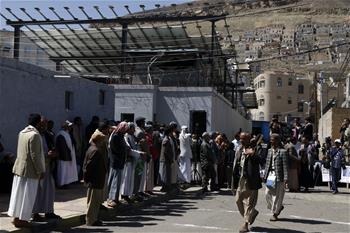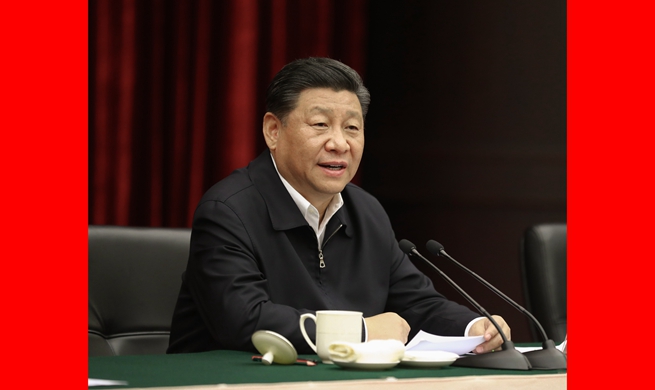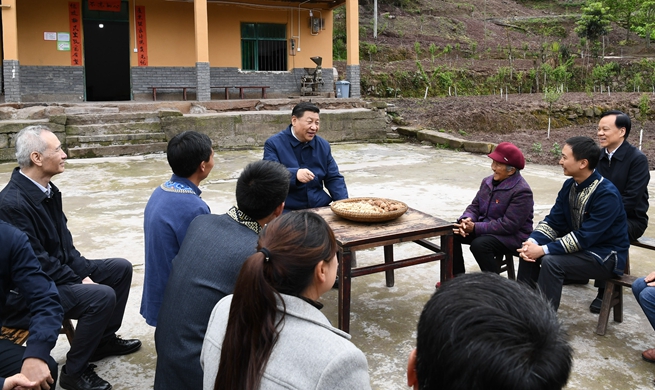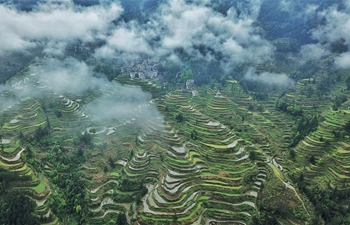NAKURU, Kenya, April 18 (Xinhua) -- Sophie Kemuma, a commercial dairy farmer in Kaptembwa area in Nakuru County in northwest Kenya describes the current dry spell as a totally different and unique situation for her.
"I have never bought water for the cows in the last eight years but this time I am forced to because Ndarugu river has dried up and water ponds where the cows would drink the water have also dried up," Kemuma told Xinhua in an interview on Thursday.
Her dilemma is how to maintain the cows' high productivity while minimizing the costs of feeding them.
"I have 10 cows and each day I have to spend 100 shillings (1 U.S. dollar) in buying water from a borehole. A 20 litre jerrycan is 3 shillings. It is too expensive since they have dropped milk production from 25 litres to just 5 liters," she added.
Kemuma said her flock has been grazing at a pasture patch in a leased farm about six kilometres away from her homestead.
"I did not plan to buy hay but I have no option since the grass has been depleted," said the dairy farmer, adding that her savings would be diminished as a bale of hay is currently going for 3 dollars from 1.7 dollars.
Kemuma, however, does not foresee herself selling the cows to cut back on the costs of managing the livestock.
Normally, Kenya welcomes the rains late March to early April when most of the farmers plant crops or pasture. This year, the rains have delayed with the weather department indicating uncertainties in the onset.
The challenges facing Kemuma are prevalent across the east African nation whose economy is anchored on agricultural activities and rain is mainly the source of water, thus prolonged drought causes immense losses.
While the effects of adverse weather remain an inevitable challenge, experts suggest adoption of mitigation alternatives to maintain resilient households that cannot fall back to poverty.
Assan Ng'ombe, a resilience officer at Alliance for a Green Revolution in Africa (AGRA) indicates that farmers such as Kemuma can join or form village lending and saving schemes to serve as safety nets during harsh weather periods when more resources are needed to run farm activities and sustain families.
"Farmers through organized groups can contribute to a common pool of resources that can be available for drawing when times are hard," said Ng'ombe.
He noted that one of the best insurance for the farmers is investing in a healthy environment including practicing afforestation and agro-forestry.
"A healthy environment will not only mitigate climate change but also provide adaptation options that will cushion farmers and communities from falling back into extreme poverty," he noted.
Tom Nyamache, an economist said that drought weakens the purchasing power of households as necessities become expensive thereby eating into savings serving as contingency reservoirs.
"Drought has ripple effects on economy because the resources that households may have put aside for investments are instead diverted to emergencies during drought," he said.
While referring to Kemuma's predicament, Nyamache said households become poorer when their sources of livelihood are threatened and they are unable to sufficiently counter the threat.
"There must be appropriate options to cushion the farmers for instance a favorable insurance by either government or private sector or through partnership," he noted.
"Pro-active framework involving establishment of water infrastructure and climate resilient systems must be put in place to stabilize farmers' productivity throughout the year," he added.













